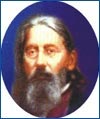Tearing tensive pains over small parts, at a time; quickly changing location.
Tissues
Acts markedly on the periosteum; synovial membranes of joints, especially small joints; that part of nervous system which presides over function of voluntary motion.
Stands in close relation to the fibrous tissues; redness, swelling, heat, etc., not tending to suppuration, but easily and quickly changing location; redness paling as disease shifts.
Painful flexion of the joints.
Emaciation. OEdema. Anasarca.
Dropsy of cavities and internal organs, especially hydropericardium; hydrothorax; ascites; hydrometra.
Contact Injuries etc.
Touch:, Pressure:,. When the head is raised:.
Skin
Skin dry sweat suppressed, or profuse sweating.
Stitches in the skin.
Tingling here and there, as after being frosted.
Stages and States
Gout in persons of vigorous constitution.
Often indicated with old people.
Relationship
Antidotes to Colchic: For the affection of the heart, feels as if dying: Spigel. Copious draughts of rice water, prevent its action on the bowels. In poisonings give Ammonium caust., a few drops in sugar water.
General antidotes to Colchic: Belladonna, Camphor., Coccul., Nux vomica, Pulsat.
Colchic. follows well where Nux vomica or Lycop. has relieved.

